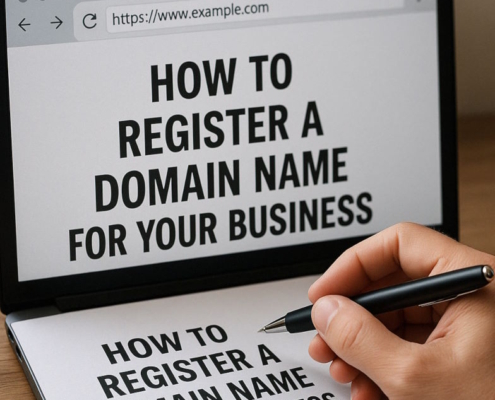Introduction
To succeed online, you’ll need an excellent website with eCommerce features, regardless of whether you intend to start a dropshipping or wholesale business or sell original handmade goods. Starting an eCommerce business is now easier than ever due to the abundance of excellent code-free website builders and the comparatively low setup expenditures. This post will walk you through the process of opening an online business in just eight simple steps. Fulfill the goals you have for your eCommerce company right now!
1. Select a profitable niche and identify your target market
Selecting the niche market you want to service is the fundamental step in opening an Internet store. Choosing a specialty without paying attention to the following three factors is one of the major mistakes made by new business owners:
- Profitability: In order to develop a profitable online business and realize a profit on your investment, you want to choose a profitable niche. A product’s likelihood of becoming profitable is low when it is too costly to produce or buy in bulk. Likewise, an item may be too costly to ship and would be a better fit for an in-person sale.
- Searchability: People’s most popular products are stocked by the leading online retailers. For example, if you want to launch an internet business selling dog leashes, be sure to target the keyword “dog leashes.” Determine what products people look for by using SEO tools.
- Think about your passions. As an example, what topics would you like to discuss or look into? You’ll be more inclined to persevere through difficult times if you have a strong enthusiasm for what you sell. Additionally, since you are the authority in a certain industry, field, good, or service, you would like customers to refer others to your store.
The importance of the audience you are targeting has equal significance to that of your niche. You want to be certain that they will find your products interesting and that they will have no issue making a purchase. If someone isn’t part of your target market, don’t ask them what they think about your product.
2. Select a product line
It’s time to select your service or product line after you’ve identified your target market and specialty. The most difficult aspect of opening an online store may be this. Make sure you’re not selling anything that no one is looking for or that would be too costly to make. Additionally, it’s critical to confirm that you have the means, including transportation and storage, to support your merchandise.
How are you going to set your product apart from the competition if you decide on an already well-liked product? Is there anything you can do to make an already great product better? How are you going to ensure that your web store is the preferred place to buy this product?
3. Create your own assets and name for your brand
Choosing your brand or company name and creating your brand assets, like your logo, comes next after you decide what you want to market. This phase may come very naturally to some people while being very difficult for others. Using a domain name registration service like GoDaddy to look for available domains is one method that companies frequently use to sift through name suggestions. The rationale is that, in theory, your domain name should correspond with the name of your company.
Canva is an excellent starting point if you’re unsure of where to start when making your logo. Many easily customizable, free logo templates are available. Should you choose not to attempt logo design yourself, you can always pay someone through sites such as Fiverr or 99Designs to do it for you.
4. Register your enterprise
You’ll need an EIN (employment identification number) to handle transactions for your e-commerce site. You must register the online shop as an entity in your state in order to receive an EIN. Small businesses often register as limited liability companies (LLCs), which help safeguard your personal assets in the event that your firm is sued, though you can register as a corporation or sole proprietorship as well.
Consult with your tax expert to see whether forming an LLC is the right choice for your situation since there are tax benefits to doing so for your new business. State-by-state variations exist in the business registration procedure, thus it is recommended to consult your state’s Secretary of State for more comprehensive details. As an alternative, you may always use LegalZoom as well as ZenBusiness, two services that help register businesses.
5. Select an e-commerce platform
Picking an e-commerce platform is the next step. Your online store will be created and run on this platform. Fantastic e-commerce platforms like Shopify, Squarespace, and Square are available for selection. It is worthwhile to invest the time to select the best platform for you, though, since each one has a distinct set of characteristics that affect pricing, functionality, and user-friendliness.
Top e-commerce platforms for creating an online store quickly and simply include the following ones:
- Squarespace: The best option for inexperienced web designers who want to quickly and simply create a stunning online store with integrated marketing features for just as little as $14 a month with yearly pricing.
- Shopify: The top e-commerce platform for creating a dropshipping store is Shopify. Plans begin at $29 a month and usually entail spending about $250 on a premium theme.
- Square: This platform is ideal for individuals on a tight budget, as it provides free options for both in-person and online sales.
See the top e-commerce solutions for additional details and guidance in selecting the finest option for your online store.
6. Develop your online store
Upon selecting an e-commerce platform, the subsequent course of action involves accessing the said platform, registering, and initiating the development of your virtual store. Whatever platform you’re using will determine the specific stages, but generally speaking, they will entail something like this.
How to create a website for an online store:
- Go to your preferred e-commerce site, like Square, and register for an account.
- Select a domain name, which is usually included in a plan; if not, buy it individually.
- Choose a theme or template.
- Include your company name and logo.
- Personalize every web page on your website, including the homepage.
- Make product listings and add your products.
- Install a processor for payments.
- Set up calculators for taxes and delivery, for example.
As you follow our thorough, step-by-step directions, you will learn how to design a website.
7. Optimize your website
After launching, optimize your online store for search engines to increase its visibility online and with search engines like Google. This will enhance your website’s exposure, attract more visitors, and boost sales—all at no cost to you.
Some of the things you may do to improve your website are as follows:
- Title tags: The text seen on search engine results pages (SERPs) is known as the title tag content. A product or service-related title tag has to be both descriptive and pertinent.
- Meta description: Title tag content beneath your meta description in the search engine results page is known as the meta description. To entice readers to go over to your website, use engaging and descriptive wording.
- H Tags: Headings on the page are labeled with H tags. Assist in clarifying the topic of the page and make sure they are descriptive.
- Pictures: Put some pictures on the page and make sure you tag them appropriately with relevant keywords.
8. Market your website to the world
Following the launch, you must promote your internet store. This is because SEO is an essential part of your long-term business development strategy. Now, you may increase visitors by marketing your services and products
You may market your online store in a number of ways.
- Include your brand in internet directories.
- To market your brand, collaborate with influencers.
- Internet marketing, like Facebook or Google Ads.
- To improve your website’s internet visibility, use content marketing.
- Make social media accounts and use them frequently.
- Programs for referrals or loyalty.
- Press releases are useful (if you have very distinctive or innovative products).
- Participate in affiliate marketing programs.
- Try marketing by word-of-mouth.
Your company and the services or products that you sell will determine the most effective strategy for promoting your online store. A lot of, if not all, of such tactics are used simultaneously in successful marketing efforts. See which approaches work most effectively for you after trying a few different ones.
The significance of e-commerce
Because of how instantly available and connected our world is, there’s a good reason why this generation is frequently referred to as the “instant gratification generation.” If you have an internet website, customers can buy your goods and services from anywhere in the world with only a few clicks, 24/7/365. An electronic commerce store is another name for this. A sale may be made or lost based on your website’s overall design, loading time, and content.
To succeed online, knowing how to start an online store is essential, whether you’re venturing into dropshipping, wholesale, or selling handmade goods. Learning how to start an online store involves selecting a profitable niche, identifying your target market, and choosing the right eCommerce platform. Understanding how to start an online store is crucial, from creating your brand assets to optimizing your website for search engines. Knowing how to start an online store also includes strategies for marketing and promoting your business effectively. Finally, mastering how to start an online store helps you build a successful online presence and reach your eCommerce goals.
Frequently Asked Questions
1. What is the cost of launching an Internet e-commerce store?
Depending on what platform and functionality you require, there are different starting costs for online stores. A monthly charge is associated with certain platforms, while others are free to use. For under thirty dollars a month, there are e-commerce options available. Just cover the costs of shipping, merchandise, and promotion after that.
2. Where can I find products to sell on my internet store?
Wholesalers, producers, and distributors are just a few of the places you might find products for your web business. Alibaba & DHgate are well-known manufacturers’ aggregators. Abound and Faire are two popular websites used by store owners to find wholesale goods.
3. If I have no money, how can I open an online store?
The simplest method for starting a business without any money is to use a free platform for e-commerce and sell digital goods or services. By doing this, you only pay for each transaction. PDF workbooks, editing services, and printable goods are a few examples.
4. What distinguishes an online store platform from online store hosting?
The tools provided by an e-commerce platform enable you to create a visually appealing page or set of pages that prospective buyers may visit to learn more about you. However, an e-commerce site host is responsible for hosting the website. Platforms that are able to handle the traffic sent towards them host websites.
5. Which areas of my e-commerce store should be the most important?
You should have sections or pages for your products or services, a place for customers to check out, contact information, an about page that gives information about the business and what it offers, a frequently asked questions (FAQs) page that helps address a few of the questions your customers might have about your store and what you are selling, and a policy page that gives you a few legal safeguards in the event that there are disputes. This section of the page must deal with details about your liability, privacy policy, return policy, and other similar issues.
6. What are some simple ventures that one can launch?
Selling digital items is one of the lowest overhead and easiest business models to get started with. Software, audio files, e-books, and online courses might all fall under this category. This is a fantastic choice for you if you are an expert in a certain field or niche. The fact that dropshipping eliminates the need for inventory makes it an excellent choice as well. You might also make your own or purchase goods in bulk. Once your product is created, you can sell it on your own site or on other websites, like Etsy or Amazon.






























